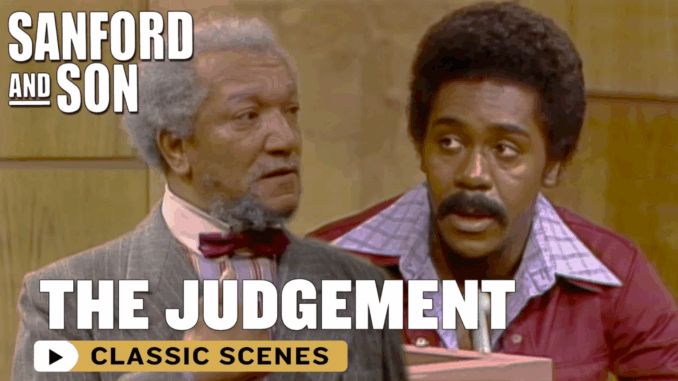
In Sanford and Son Season 3, the episode titled “Fred Sanford, Legal Eagle” opens with a seemingly light-hearted setup: Fred decides to represent himself in small claims court after a dispute with a neighbor. As expected, hilarity ensues—Fred fumbles through legal jargon, interrupts the judge, and turns the courtroom into a circus of sarcasm and confusion.
But beneath the laughter, this episode subtly tackles one of the most overlooked realities of 1970s America: Black self-advocacy in a system built to ignore them.
Fred Against the System
In classic Sanford and Son fashion, the episode is framed around Fred’s stubbornness. He refuses to pay a repair bill and decides to take matters into his own hands. But once inside the courtroom, the real power dynamic is laid bare. The judge is dismissive. The other party is condescending. The setting is designed to intimidate Fred—and he knows it.
Still, Fred pushes back. In his trademark swagger, he may mispronounce Latin phrases and object to his own arguments, but he also demands to be heard. The joke isn’t that Fred is dumb—it’s that he’s navigating a system never designed to accommodate people like him.
Comedy as Commentary
By the time the episode ends, Fred has lost his case, but not his dignity. That’s the brilliance of this episode: it flips the courtroom trope. Fred’s victory isn’t in the verdict—it’s in his refusal to be silenced.
Norman Lear’s sitcoms were often bold in their social commentary, and while Sanford and Son leaned more into broad humor, this episode is proof that the show knew when and how to get serious.
In 1974, when this episode aired, the image of a working-class Black man standing up for himself in court—on national television—was quietly revolutionary.
The Legacy of “Legal Eagle”
“Fred Sanford, Legal Eagle” may not be the most quoted episode of Sanford and Son, but it holds up as one of its most important. It reminds us that dignity doesn’t come from winning—it comes from showing up, speaking out, and demanding respect, even when the odds are against you.
That message still resonates today.
Article 3: The Heart of the Show Was Grady — Why Whitman Mayo’s Character Became a Fan Favorite
While Sanford and Son will always be synonymous with Redd Foxx’s Fred Sanford, one of the most surprising and enduring characters to emerge from the series was the gentle, slow-talking, delightfully confused Grady Wilson, played by Whitman Mayo.
Introduced as one of Fred’s longtime friends, Grady was originally meant to be a supporting character—comic relief to fill in the gaps. But something unexpected happened: audiences loved him. And for good reason.
The Anti-Fred
Where Fred Sanford was brash, quick-witted, and constantly scheming, Grady was mild-mannered, confused by modern life, and often bewildered by Fred’s wild ideas. But that contrast is exactly what made him work. He gave the show balance.
Grady’s frequent lines—“Good goobly goo!” and “Great googly moogly!”—became catchphrases in their own right. His blank stares and hesitant reactions were timed perfectly. He didn’t try to steal the spotlight from Fred; instead, he brought a different rhythm to the comedy, slowing things down just enough to make each laugh hit harder.
Carrying the Show in Fred’s Absence
In 1974, Redd Foxx temporarily left Sanford and Son due to contract disputes. It could have spelled disaster for the show. Instead, NBC made a bold move: they promoted Grady to the lead.
In a series of episodes, Grady became the center of the show, taking over the junkyard and caring for Lamont. Whitman Mayo stepped up with unexpected ease. He didn’t try to imitate Fred. He let Grady remain Grady—nervous, confused, but deeply well-meaning.
While the ratings dipped slightly, many fans admired the show’s willingness to give Grady his moment. It was rare in the 1970s for a supporting Black actor to be given that kind of trust from a major network.

Grady’s Spin-Off: A Noble Misfire
NBC even tried to give Grady his own series, simply titled Grady, in 1975. It followed the character as he moved to Los Angeles to live with his daughter. The series only lasted ten episodes, but the attempt was significant. It was one of the earliest efforts to build a new show around a side character from a Black-led sitcom.
Though Grady didn’t last, it reinforced the affection fans had for Whitman Mayo. He returned to Sanford and Son and continued to appear in reunion specials and later projects.
Why Grady Still Resonates
Grady wasn’t cool. He wasn’t a hustler or a rebel. He was a sweet, confused, loyal friend who loved his family, respected his elders, and tried (sometimes badly) to do the right thing. In a sea of big personalities, he was the quiet heart.
Today, fans still quote Grady’s lines and celebrate his appearances. He represents the side of Sanford and Son that doesn’t get enough credit: tenderness.
In a show built on insults and outrageous schemes, Grady reminded us that sometimes the biggest laughs come from the gentlest souls.